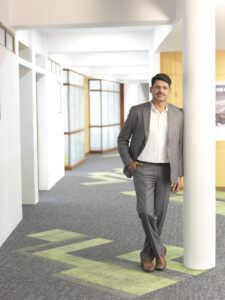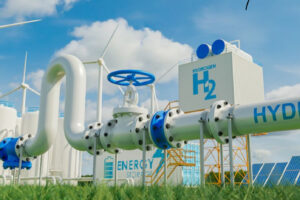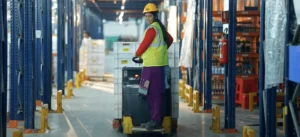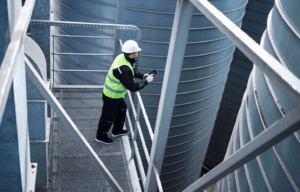An Exclusive By Enersider Desk
In an exclusive interaction with Enersider.com, Dimitrov Krishnan, Managing Director and Head of Region India at Volvo Construction Equipment (Volvo CE), shares insights into the company’s strategic vision and its alignment with the Government of India’s Viksit Bharat 2047 initiative. In conversation with Megha Manchanda, he reflects on Volvo CE’s nearly three decade-long journey in India, highlighting key milestones and the company’s ongoing commitment to sustainable infrastructure development.

1. How is Volvo CE poised to contribute to the Government of India’s Viksit Bharat 2047 plan?
At Volvo CE India, we see the Viksit Bharat 2047 vision as a powerful call to action and we are proud to be contributing meaningfully toward it. India’s development journey now rests on long-term, integrated national planning, and we believe this demands a clear vision and readiness of infrastructure at least a decade in advance. We are facilitating this shift through local manufacturing, product innovation, and skill development.
We pioneered the entry of electric construction equipment into India in 2023 and continue to advance cleaner technologies like battery-electric and grid-connected machines. At the same time, we are expanding our India-centric portfolio with locally developed solutions like the EC210, which is engineered for fuel efficiency, low emissions, and affordability. Parallelly, we are investing in large-scale workforce reskilling through certified training programs to build a future-ready infrastructure sector. Through these efforts, we are not just building machines, : we are helping build the foundation of a developed nation.
2. What should the infrastructure and construction journey towards Viksit Bharat 2047 look like?
India’s path to Viksit Bharat will have to be constructed on scale, speed, and sustainability. The scale of future infrastructure projects is increasing, timelines shortening, and environmental considerations tightening. To address these changing imperatives, the construction equipment industry will have to adopt mechanisation, digitalisation, and emission reduction.
We think infrastructure development must be ten years ahead of the curve for India to reach its full potential. This entails the widespread use of things like AI-based diagnostics, telematics and predictive maintenance to enhance uptime as well as efficiency. Electrification also plays a critical part. Our electric machines and Equipment-as-a-Service model enable customers to embrace clean technology without a huge cash outlay. India must also keep localising in both production and R&D to create a globally competitive, self-sufficient ecosystem. With appropriate policy and industry convergence, the sector can help India not simply expand, but lead.
3. Volvo CE has been around in India for the last 27 years and the brand is very well recognised. You have a range of India-specific products as well. Will there be an increase in bespoke offerings by the company for the Indian market?
Yes, absolutely. India is a unique market—performance-driven, cost-conscious, and incredibly diverse in its applications. Our strategy has always centered around deep customer insight and continuous adaptation. In recent years, we have intensified our focus on developing products specifically for Indian conditions—be it extreme temperatures, varied terrains, or usage across urban, rural, and off-road environments.
We are not just present in India; we are purposefully relevant. With a growing portfolio of locally engineered machines like the EC210, we are ensuring our solutions meet Indian needs in every sense—efficiency, reliability, sustainability, and value. Our investments in local R&D and product development will continue to grow, and so will our India-specific offerings. As the market evolves, so will we, co-creating with our customers to deliver what truly matters to them.
4. The company mentions that it is in the business of providing construction solutions and delivering premium products and services in a sustainable manner. Can you elaborate on the sustainability aspect of your business?
Sustainability is at the core of everything we do at Volvo CE. It drives how we design, manufacture, and deliver our solutions. In 2023, we became the first to introduce electric construction equipment in India, and we continue to expand our clean technology portfolio with battery-electric and grid-connected machines, while improving fuel efficiency and reducing emissions across our range.
Our commitment also extends to our operations. Our Bengaluru plant is powered by solar energy, and we’ve achieved a 30% reduction in energy consumption over the past five years. We’ve also remanufactured over 10,000 parts, supporting a circular economy and reducing waste.
Beyond machines, we focus on upskilling the workforce through certified training programs, ensuring sustainability is embraced across the value chain. For us, it’s about creating long-term value for our customers, communities, and the planet.
5. Volvo CE has said that it intends to double its market share. Can you take us through the journey of achieving this milestone?
Doubling market share is an ambitious but attainable goal considering the trend in infrastructure development and our continued investment. Our three-pillar strategy of growing localised product offerings, enhancing customer connections, and innovation in sustainability has been enabled by the introduction of the EC210 Hydraulic excavator. This has enabled us to establish a firm foothold in the competitive mid-range segment. The performance of the equipment coupled with its fuel efficiency and localised design has resulted in an appealing option for Indian contractors.
We are also committed to expanding our network, enlisting new dealerships, increasing service coverage, and enhancing after-sales support in order to reach customers in a more efficient manner. Our Equipment-as-a-Service proposition is reducing the cost and risk of adopting electric and hybrid equipment. These actions, coupled with our high-productivity equipment expertise and solid sustainability credentials, give us the confidence that we’re in a position to substantially expand our share in a growing sector.
6. In terms of sustainable best practices, how does the company deploy them in the construction equipment sector?
At Volvo CE, sustainable best practices are embedded across the entire value chain, from design and manufacturing to operations and after-sales. In the construction equipment sector, this means advancing both environmental and operational sustainability. We lead with innovation through cleaner technologies like battery-electric and grid-connected machines, while products like the India-developed EC210 are built for low fuel consumption, reduced emissions, and cost-effective performance. Advanced engines and smart systems across our range help further minimise environmental impact.
Our Bengaluru plant is powered by solar energy and follows eco-friendly practices including waste segregation, water conservation, and process efficiency. We also enable a circular economy by remanufacturing components, reducing waste and extending part life.
Through responsible sourcing, ethical supply chain practices, and operator training programs focused on fuel efficiency, we ensure sustainability is part of every step. For us, it’s not an add-on—it’s how we build, operate, and innovate.
7. The construction equipment industry has been growing on an average 25% y-o-y. Where do you see this number by the end of the current financial year?
Despite being an election year, the Indian construction equipment market has continued to show resilience. In FY 24-25, due to the government’s continued push for infrastructure, industry growth was about 4 percent with higher growth in export of construction equipment from India. The two previous years 2022-23 & 2023-24 had industry growth rates of over 25%. Major initiatives like the National Infrastructure Pipeline, along with sustained spending in roads, railways, ports, and urban development, are driving demand.
At Volvo CE, we are prepared to meet this demand through our expanded product portfolio, increased localisation, and a robust service and dealer network. The rising awareness around fuel efficiency, sustainability, and lifecycle value is also influencing customer preferences, areas where we continue to lead.
8. What is the future outlook for the construction equipment industry in the near future?
Five major changes are defining the future of India’s CE industry: electrification, digitalisation, regulations alignment, skill development, and localisation. As the Bharat Stage-V norms kick in from 2025, we will have a regulated CE industry with enhanced safety and competitiveness.
This will also facilitate export-grade machines from India to tap new opportunities around the world. Hybrid and electric equipment will pick up steam with boosts from models such as Equipment-as-a-Service that minimise up-front spending. Smart manufacturing and AI-based fleet management and connected equipment become the norm.
The workforce will also require upskilling in scale, so we’re doubling down on training of operators in accredited programs and simulators. As a whole, the Indian CE market is ready to grow and even lead—both in terms of innovation and in the development of global sustainable infrastructure. We at Volvo CE position ourselves as a long-term partner to a future like this.







